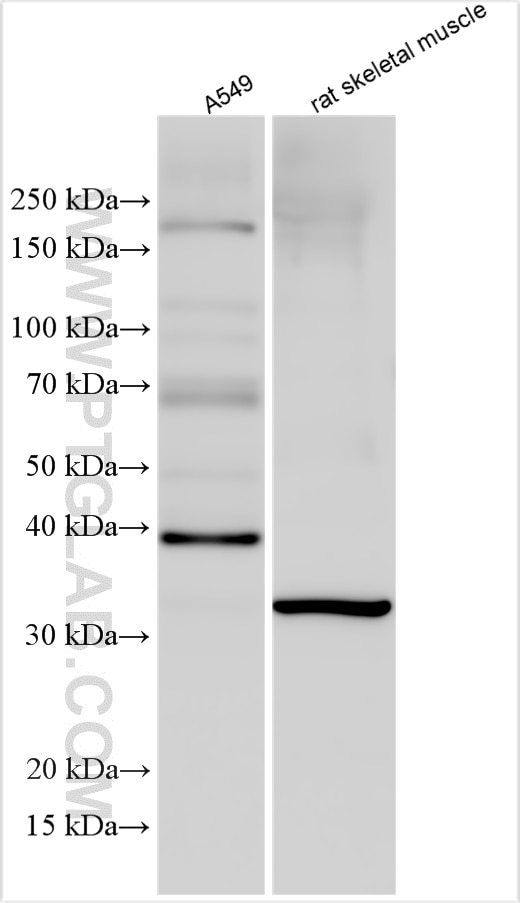Tested Applications
| Positive WB detected in | A549 cells, rat skeletal muscle tissue |
Recommended dilution
| Application | Dilution |
|---|---|
| Western Blot (WB) | WB : 1:500-1:1000 |
| It is recommended that this reagent should be titrated in each testing system to obtain optimal results. | |
| Sample-dependent, Check data in validation data gallery. | |
Product Information
30302-1-AP targets OGG1 in WB, ELISA applications and shows reactivity with human, rat samples.
| Tested Reactivity | human, rat |
| Host / Isotype | Rabbit / IgG |
| Class | Polyclonal |
| Type | Antibody |
| Immunogen | OGG1 fusion protein Ag32962 Predict reactive species |
| Full Name | 8-oxoguanine DNA glycosylase |
| Calculated Molecular Weight | 22 kDa, 36-40 kDa, 45-57 kDa |
| Observed Molecular Weight | 36-40 kDa |
| GenBank Accession Number | BC000657 |
| Gene Symbol | OGG1 |
| Gene ID (NCBI) | 4968 |
| RRID | AB_2935539 |
| Conjugate | Unconjugated |
| Form | Liquid |
| Purification Method | Antigen affinity purification |
| UNIPROT ID | O15527 |
| Storage Buffer | PBS with 0.02% sodium azide and 50% glycerol pH 7.3. |
| Storage Conditions | Store at -20°C. Stable for one year after shipment. Aliquoting is unnecessary for -20oC storage. 20ul sizes contain 0.1% BSA. |
Background Information
The DNA damages induced by ROS contain base modification, base loss, and DNA single strand breaks, which are usually repaired by the base excision repair (BER) pathway in both prokaryotes and eukaryotes. OGG1 (The human 8-oxoguanine glycosylase 1) is the primary enzyme in BER pathway, responsible for the excision of 7, 8-dihydro-8-oxoguanine (8-oxoG), a mutagenic base byproduct that occurs as a result of exposure to reactive oxygen species. There's 8 isoforms of OGG1, with calculated MW 22 kDa, 36-40 kDa and 45-57 kDa. The difference among these isoforms is the C-terminal (317-345aa).
Protocols
| Product Specific Protocols | |
|---|---|
| WB protocol for OGG1 antibody 30302-1-AP | Download protocol |
| Standard Protocols | |
|---|---|
| Click here to view our Standard Protocols |



